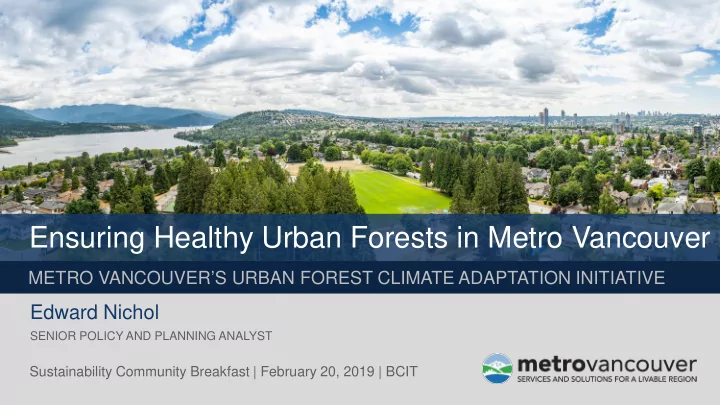

Ensuring Healthy Urban Forests in Metro Vancouver METRO VANCOUVER’S URBAN FOREST CLIMATE ADAPTATION INITIATIVE Edward Nichol SENIOR POLICY AND PLANNING ANALYST Sustainability Community Breakfast | February 20, 2019 | BCIT
Outline • Regional Urban Growth • Regional Climate Change Impacts • Urban Trees and Ecosystem Services • Urban Forest Climate Adaptation Initiative Framework Design Guidebook Species Selection Database • Opportunities for Integration 2
Member Jurisdictions 21 municipalities one Electoral Area and one Treaty First Nation WORKING TOGETHER FOR A LIVABLE REGION 3
Regional Urban Growth 4
Metro 2040 2016 2040 2,570,000 3,400,000 975,000 1,300,000 1,355,000 1,700,000 5
Regional Climate Change Impacts • Climate projections: Hotter, drier summers Warmer winters, reduced snowpack More extreme rainfall events • Impacts to ecosystems 6
Ecosystem Services Provided by Trees 7
Urban Forests in a Changing Climate • Provide ecosystem services, including climate adaptation BUT • Must be healthy and climate resilient to provide these services • Practical and regionally specific guidance was lacking 8
Urban Forest Climate Adaptation Initiative Goal: • Climate change is considered as part of urban forest planning and management • 3 outputs: 1. Framework 2. Species selection database 3. Design guidebook 9
1. Urban Forest Climate Adaptation Framework • Purpose: Assess current vulnerabilities, identify future risks Develop tools to build resilience • Management guidelines • 3 key steps to help practitioners select climate-adapted species 10
2. Species Selection Database • Local climate suitability • Tree growth predictions • Tree selection considerations • Recommended locations: Maximize benefits 11
3. Design Guidebook 12
Opportunities for Integration Metro Vancouver demonstrates bold leadership in responding to climate change • Resilient infrastructure, ecosystems, communities • 80% reduction in greenhouse gases in the region 13
14
Climate 2050 Roadmaps 15
Thank you!
Recommend
More recommend